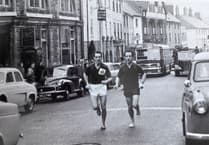Tributes have been paid to one of the UK’s leading cancer research scientists who was found dead in woodland near Usk a few days after Christmas.
Professor Alan Clarke, 52, was instrumental in forming Cardiff University’s European Cancer Stem Cell Research Institute and served as its director.
He was also director of research in the university’s School of Biosciences and the director of Cancer Research UK’s Cardiff Centre.
Professor Jim Murray, head of the School of Biosciences, said his sudden and untimely death’ ‘will be felt by all of us who knew him and the wider scientific community’.
“He was an invaluable colleague, a patient and thoughtful mentor and an outstanding scientist and leader.
“At this tragic time our thoughts are with his family, friends and close colleagues.”
Gwent Police were alerted to the discovery of Professor Clarke’s body in the wooded area at Llanllowell at around 9.40pm on Monday December 28.
An inquest into his death was adjourned for six weeks by Gwent coroner David Bowen but Professor Clarke’s body will be released to his family for funeral purposes.
Cardiff University posted on its website that Professor Clarke had died suddenly over the Christmas and New Year period ‘whilst walking with his dog’ and said staff and students had learnt of his untimely death ‘with great sadness’.
Professor Clarke’s main research interest was in the molecular basis of cancer, particularly in the very early stages when cells initially diverge from normality.
His research focused on modelling intestinal, breast and prostate tumours and the ability to use these to study the relationship between normal stem cells and cancer stem cells, and how these different cell populations contribute to tumorigenesis.
He also had a track record in preclinical testing of new drugs for breast cancer which, under his leadership, was extended to intestinal and prostate tumours.
* Cancer Research UK’s Cardiff Centre, where he was director, is a partnership between Cancer Research UK, Cardiff University, Velindre NHS Trust and Cardiff and Vale University Health Board.
It aims to boost research activities in the city and increase the rate at which findings are translated into therapies for certain cancers, tailored to patient needs.





Comments
This article has no comments yet. Be the first to leave a comment.